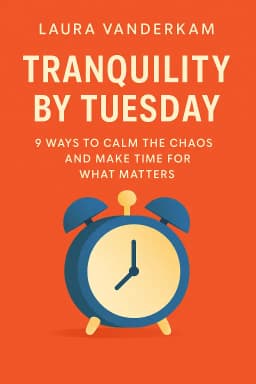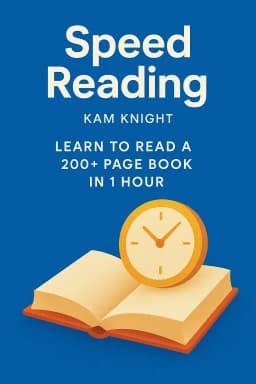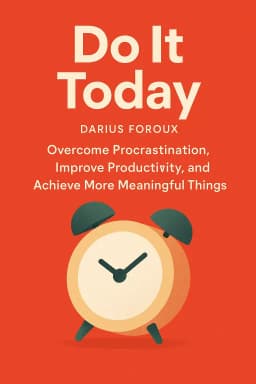
The Freedom of 'No'
Golden Hook & Introduction
SECTION
Mark: Office workers lose up to six hours a day to distractions. That’s not a week, that’s per day. Michelle: Hold on, six hours? That’s almost a full workday. That can't be right. Mark: It is. And it adds up to a trillion-dollar hit on the US economy every single year. But what if the secret to getting all that time and focus back isn’t some new app or complicated system, but a simple, two-letter word? Michelle: Okay, I'm listening. What's the word? Mark: The word is "no." And it's at the heart of a powerful framework in Michael Hyatt's book, Free to Focus. What's so compelling about this book, which is highly acclaimed in productivity circles, is that Hyatt isn't some theorist living in an ivory tower. Michelle: Right, he wasn't just observing this from afar. Mark: Not at all. He was the CEO of a major publishing house, Thomas Nelson. He was living the high-pressure, always-on life. And his entire system was born from a personal crisis—a terrifying health scare that forced him to completely re-evaluate what success and productivity even mean. Michelle: That makes a huge difference. This came from a place of real pain, not just a clever idea. It means the advice has been pressure-tested in the real world. Mark: Exactly. It started with him having dinner in Manhattan, feeling on top of the world, when suddenly, everything changed.
The Distraction Economy & The Power of the Pause
SECTION
Michelle: What happened? Mark: He’s at a nice dinner with a colleague, trying to relax after a packed day of meetings. And out of nowhere, he feels this intense, crushing pain in his chest. He immediately thinks the worst: this is it, I’m having a heart attack in the middle of a restaurant. Michelle: Oh, wow. That’s terrifying. Mark: He tries to play it cool, but the pain gets worse. He finally confesses to his colleague, who rushes him to the nearest hospital. They run all the tests, hook him up to machines... and find nothing. Absolutely nothing wrong with his heart. Michelle: So it was a false alarm? Mark: It was, but it happened two more times over the next year. Same scenario, same chest pain, same hospital visit, same result: no heart problem. Finally, his cardiologist back home sits him down and gives him the real diagnosis. It wasn't his heart; it was severe acid reflux, brought on by overwhelming, chronic stress. The doctor's warning was chilling: "If you don't change how you're living, this stress will eventually cause a real heart attack." Michelle: That’s a wake-up call from another universe. And honestly, that feeling of being perpetually overwhelmed, of being pulled in a hundred directions at once… that feels so familiar. It's the baseline for so many of us. Mark: It is. And Hyatt gives it a name: he calls it the "Distraction Economy." It’s this modern environment where our attention has become the most valuable, and most scarce, resource. Think about it. Over two hundred million emails are sent every minute. The average office worker gets interrupted every three minutes. Michelle: Every three minutes! You can't even finish a complete thought in that time. My phone's notification screen is a perfect monument to the Distraction Economy. Mark: Precisely. And Hyatt points out the conventional response to this pressure is what he calls the "Red Queen" effect, from Alice in Wonderland. The Queen tells Alice, "Here, you see, it takes all the running you can do, to keep in the same place." We think the answer is to run faster, to do more, to hustle harder. Michelle: Which just leads to burnout, like the kind that put him in the hospital. So many productivity books are about cramming more into your day. How is Hyatt’s approach different? What’s the alternative to just running faster? Mark: This is the first, and most counterintuitive, step of his system. The alternative is to Stop. Michelle: Just… stop? In the middle of all that chaos? Mark: Yes. Before you act, you have to stop and get clear. He breaks "Stop" into three parts: Formulate what you actually want, Evaluate what you're currently doing, and Rejuvenate to get your energy back. It’s about pausing the frantic activity to ask the most important question: "Am I even running in the right direction?" Because if you're on the wrong road, going faster just gets you to the wrong destination quicker. Michelle: That feels both incredibly simple and revolutionary. The idea that the most productive thing you can do is nothing—just for a moment, to think. It’s a direct rebellion against the cult of busyness. Mark: It's a total rebellion. And it sets the stage for the next step, which is where the real magic of reclaiming your time happens. It’s where you learn to use that two-letter word.
Strategic Subtraction: Winning by Saying 'No'
SECTION
Michelle: Okay, so after you've stopped and figured out your priorities, what comes next? Mark: The next step is "Cut." And this is where the book gets incredibly tactical. Hyatt argues that time is a zero-sum game. You only have 168 hours in a week. That's it. So the core principle is this: every single time you say 'yes' to something, you are simultaneously saying 'no' to something else. Michelle: I’ve never really thought of it that way, but it's completely true. Saying yes to a late meeting is saying no to dinner with your family. Saying yes to a weekend project is saying no to rest or a hobby. Mark: Exactly. He gives a simple example: someone asks you to a 7:00 a.m. breakfast meeting. If you say yes, you might be implicitly saying no to your morning workout. The trade-off is always there, whether you acknowledge it or not. The goal of the "Cut" phase is to make those trade-offs conscious and deliberate. Michelle: That makes sense. But let's be honest, saying 'no' is incredibly hard. There's this immense pressure to be a team player, to be helpful, to be agreeable. You worry that if you say no, you'll be seen as lazy or uncooperative. How do you actually do it without damaging your relationships or your career? Mark: This is the most common point of resistance, and the book addresses it head-on. It's not about being a jerk. It's about being strategic and graceful. Hyatt offers a brilliant technique he calls the "positive no," which is basically a yes-no-yes sandwich. Michelle: A yes-no-yes sandwich? Tell me more. Mark: Okay, so as a former publishing CEO, he was constantly getting requests from aspiring authors to review their book proposals. He wanted to be helpful, but it was impossible to do them all. So he developed a template. The first "yes" is an affirmation of the person or the request. It sounds like: "Yes, thank you so much for thinking of me and trusting me with your hard work. I'm honored." Michelle: Okay, so you start with warmth and validation. I like that. Mark: Then comes the "no." It has to be clear, direct, and without a long, waffling excuse. Something like: "Unfortunately, due to my current commitments, I'm not able to review your proposal at this time." Michelle: Direct. No ambiguity. Mark: And then you end with the final "yes," which is a positive, helpful alternative. For example: "However, I've compiled a list of resources for aspiring authors that I think you'll find very helpful. Here's a link to it. I wish you the very best of luck with your project." So you're sandwiching the clear 'no' between two layers of goodwill and helpfulness. Michelle: That is so useful. You're declining the specific request, but you're still affirming the relationship and offering value. It reframes 'no' from a rejection into a redirection. Mark: And it works for almost any situation. But what about commitments you've already made? The ones you're dreading, that are in what he calls your "Drudgery Zone"—tasks you have no passion or proficiency for. Michelle: Oh, I know that feeling. You said yes weeks ago and now it's on your calendar like a looming storm cloud. Mark: For that, he tells the story of getting out of a committee he'd agreed to serve on. He realized it was a huge drain and he wasn't the right person for it. So he went back to the person who asked him, and he followed a script. First, he took responsibility. He said, "I made a commitment to you, and I want to honor that." Second, he explained why his participation might actually hurt the project, saying "I've realized I don't have the skills to give this the excellence it deserves, and I'm worried I'd hold the team back." Michelle: Wow, that's a powerful reframe. You're making it about what's best for them, not just what's best for you. Mark: Exactly. And finally, he offered to solve the problem. He said, "But I want to help you find a solution. I've thought of a couple of people who would be fantastic for this role. Can I help you connect with them?" In the end, they were thrilled to let him off the hook because he found them someone better. He got his time back, and the committee got a more engaged member. Everyone won.
Synthesis & Takeaways
SECTION
Michelle: When you put all these pieces together—the heart scare, the Distraction Economy, the power of stopping, and the art of saying no—it feels like this book is about so much more than just managing a to-do list. Mark: It really is. The book is widely praised for its practical system, but the philosophy underneath is what gives it weight. Hyatt closes with a profound idea: "What will your life have been, in the end, but the sum total of everything you spent it focusing on?" Michelle: That gives me chills. It puts everything in perspective. Mark: It does. His ultimate argument is that the Distraction Economy wants to choose your focus for you. It wants you to spend your life reacting to notifications, answering emails, and putting out fires. This system—Stop, Cut, Act—is a declaration of independence. It's about reclaiming the authority to decide what gets your precious, limited attention. Michelle: Because what gets your attention is what gets your life. It’s not about productivity for the sake of being a better worker; it’s about productivity for the sake of being a freer person. Mark: That's the whole point. The title isn't How to Be More Productive. It's Free to Focus. The goal is freedom. The freedom to be present with your family, the freedom to do deep, meaningful work, and even the freedom to do nothing at all without feeling guilty. Michelle: I love that. So, a challenge for everyone listening: what is one thing this week—a meeting, a task, a recurring commitment—that you can say a graceful "no" to, in order to make space for a "yes" that truly matters to you? Mark: That's a perfect takeaway. Start with one small act of strategic subtraction. And we'd love to hear how it goes. Let us know what you're cutting from your life to get more focus. Michelle: This is Aibrary, signing off.









